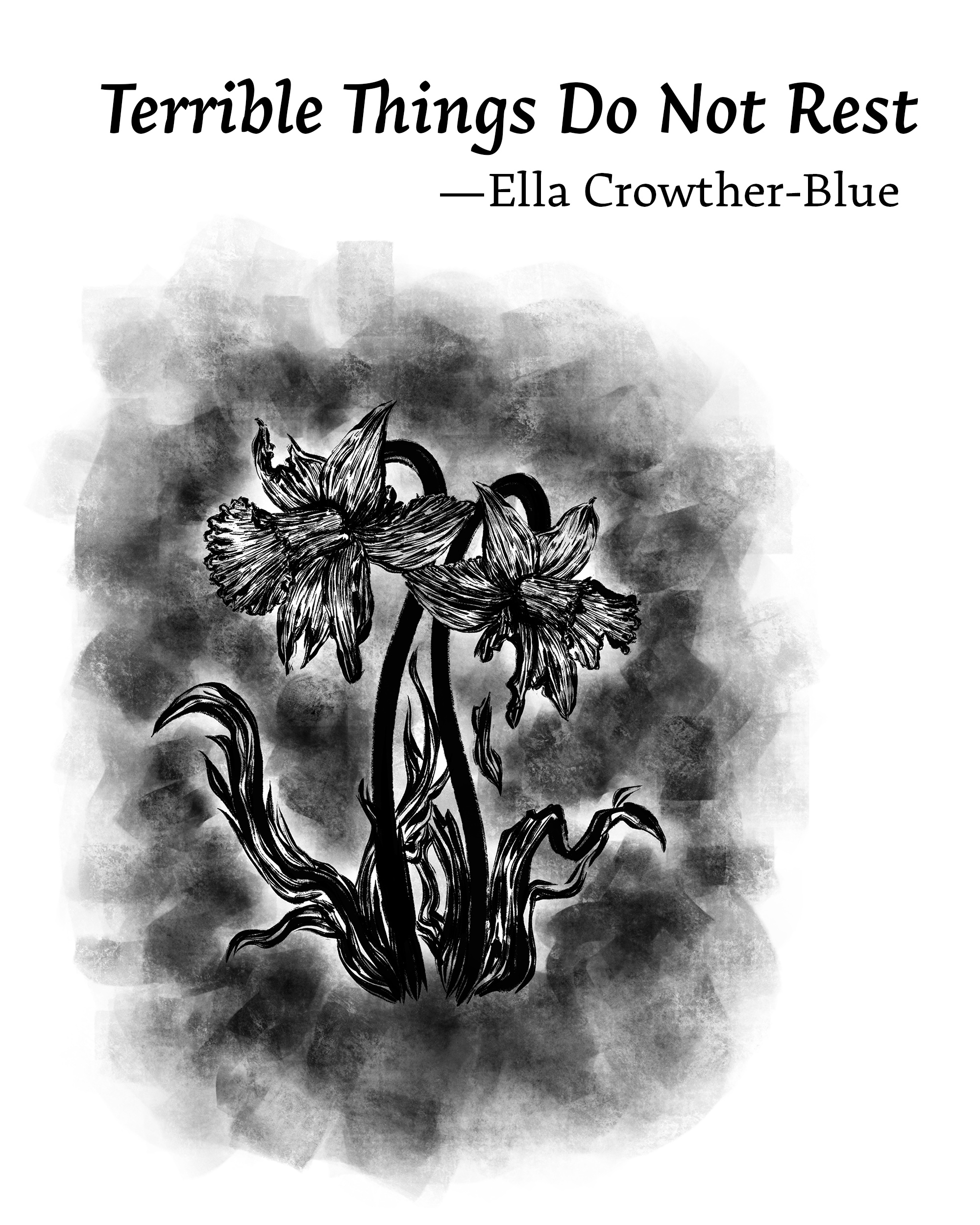Terrible Things Do Not Rest

There is a terrible thing in the lake.
Behind the lodge, down the neatly trimmed granite stepping stones, past the rim of daffodils, and under the crystalline surface, there it lies. When the songbirds come out, it hides, shrouding itself in sunken, slimy grasses. When the deer stoop to drink before jerking and skittering away, it watches. It creeps in with the dam-ruled tides, nails sinking into the mottled earth. And when dusk falls and the dark rises, so too does it.
Above is an empty world. No moon, no sun, no cricket-song, no crepusculares creeping along the outskirts of the glade. The vibrant daffodils curled over and grey.
And it waits, struggling to keep from sinking back into the depths, until the lights of the lodge on the hill shine down on the water like headlights in a foggy dark. It shrinks beneath the glare until the top of its head barely shows.
Dawn emerges. The silt below shifts, and the terrible thing sinks back to the bed by its torso. It settles in a pile of fishbones and lost trinkets.
Daylight does not reach the lakebed. Brushes of sun smear across the inky blackness, warped by the whims of the un-still surface world. Light, however, is not needed. It knows beyond the gentle, wicked water, there lingers the faint touch of the world above.
A dock. Sparrows. Patio chairs. Drag-marks. Yew trees. Footprints. Sun baked bleach.
Dusk returns, and the terrible thing fights back up through the water to face the brightly lit lodge. This time, two silhouettes flicker between the windows, passing drinks and pacing. It cannot find the want or will to look away. It sinks before dawn.
On the third night, the terrible thing guts itself. Stones tumble from its hollowed-out abdomen. It is naked and so are its insides. Now, it is no longer tethered to the lakebed; it floats, instead, just feet beneath the surface, long hair coiling above it, reaching up to the blue summer sky. Minnows flit through the tendrils.
A hiker walks by some hours later, a golden retriever jogging by her side. The day is sweltering, and she slinks off her heavy backpack to settle at the end of the dock. She pulls off her shoes, rolls up her pants, and sighs as her feet are embraced by the cool water.
The surface is a one-way mirror. The hiker has long hair, pulled back into a French braid under a well-worn cap. The terrible thing tilts its head, following her movements diligently. As it watches, the hiker’s feet tangle in its hair. A chunk of hair tugs loose at the scalp, but untangles from the hiker’s ankle before she can notice.
The retriever is skittering around the edge of the lake and whining. He stumbles, trampling a patch of daffodil, and whines more. Raising her brows, the hiker leans back and whistles lightly for her dog. He stomps, sits, stands, then stomps some more. She speaks to him, chuckling. The terrible thing opens its maw in mimicry, but no sound comes out.
The retriever starts barking, then screaming. Up the granite path, a man is shouting, and the hiker is out of the lake in a blink, cursing. She picks up her shoes and pack, and only when she is off the dock does her dog stop barking. He bites down on her pant leg and drags her back down the trail before she can get her shoes back on.
The two disappear, and there is a moment of yawning silence before the sparrows start singing again. A flock of crows settle in a far-off tree.
Another shout. Two sets of boots setting down the granite path at a quick pace.
The terrible thing closes its mouth and drifts under the dock.
A pair of men approach. One is in his favourite flannel, and the other in his university’s letterman. They walk directly onto the dock. The terrible thing has no tears with which to cry and no breath to hold. The men begin to curse.
“Who the hell was that? Do you think she saw?”
“It was just some stupid hiker. If she comes back, we’ll get the cops on her ass for trespassing.”
The terrible thing sinks and sinks and sinks and nestles down into the lakebed among the trinkets and rocks and bones. There it stays for two days, until its flesh purples and swells and its skin becomes a sogged cocoon. Lips rot away from teeth; nails flutter loose from their beds. It rots until it refuses to; until it rejects the gentle undoing of the water, until the lake seems satisfied with that which it has become, and it waits patiently, indifferent, holding the terrible thing.
On the sixth night, the terrible thing creeps to the surface again. The lodge curtains are pulled shut. The two silhouettes pace behind in the dim light. One approaches the other, and in a familiar motion, is struck across the face and falls.
As the terrible thing watches, a nerveless pain rises in its chest. Fear. Anger. In the dark of the night, it takes the slightest of breaths.
Another day passes. It lingers near the surface still, gazing from the water at a sparrow perched on the corner of the dock. The sun is out, the deer stand still in the trees, all the daffodils have turned to face the lake, and the pain has not faded.
The sparrow hops up and down the dock, chirping, staring at the terrible thing through the one-way water. The sparrow wants it to come away; wants it to move on; wants it to rest. It cannot.
Crows circle the lake, gathering in the boughs of the yew trees, their anticipatory chattering dulled through the water. And for a moment, the sound soothes.
The deer return in the evening as the sky strikes gold. The stags, with their bone crowns and broad shoulders, stand back, antsy on their feet as a doe approaches the lake.
She has a little one with her, all unsure footwork and wide eyes. Stooping down, she noses the water, her breath casting gentle ripples across the surface. The terrible thing drags itself from the lakebed. Slow. Careful. What nails still cling on sink into soft sand. Just on the other side of the mirrored surface, it pauses and stares. The doe stares back. She is the one to close the distance.
A soft brush of flesh against flesh; she kisses the forehead of the terrible thing gently, tongue darting out to wipe away the gravel from its wounds. She draws back, and it follows. The lake’s surface bubbles around its head before breaking away, and for the first time in a week, the sun holds the terrible thing’s face, stroking its cheeks with warmth it could not feel.
The stags scatter, leaving the does and their fawns. The terrible thing raises a gnarled hand to the doe’s jaw, snorting slightly when it scrunches its fingers in her fur and a small, broken gurgle tumbles from its mouth. Sunlight bathes the glade, and it feels naked.
The mother-doe’s ears swivel, and she goes stiff, turning to the lodge. The deer scatter, disappearing into the brush. The crows remain in the yews.
They sit in a horizontal line across the boughs of three trees. They stare.
Remnant whispers of the herd fade, replaced by quick and heavy footfalls stumbling down from the lodge. Dusk bleeds across the sky. Seven pairs of silent, beady eyes watch the terrible thing as she shrinks back into the lake, stopping just as her head is consumed.
The two men round the corner, armed with bleach, black hoodies, old jeans, latex gloves, a pool cleaner, and garbage bags already bulky. The smaller of the two has a black eye. He trips on raised daffodil roots before he reaches the dock while the other blows past him, gets on his knees, and douses the dock in bleach. “Jesus—hurry up!”
The old towel he uses to scrub the dock rips on a jagged edge. He yells like a toddler and chucks it into a garbage bag. Inside is a hand-me-down dress, mended and worn and mended again, torn at the neckline and spattered in dried blood.
Daffodil rips as the smaller man scrambles to his feet, reaching for the fallen pool cleaner. He extends it and plunges it into the water. It waves uselessly just to the terrible thing’s right. The whole lake shudders, and a whipish current rips the pool cleaner from his grasp. He tips, falling headfirst into the water. His eyes are squeezed shut. The terrible thing stares. He thrashes.
After a handful of seconds, he is yanked from the lake by the other man, who flings him onto the dock, squealing in what he surely wishes sounded like rage.
The terrible thing watches. She opens her mouth, and nothing comes out. She has made up her mind.
The sun dips over the mountains. The crows watch the men struggle with delight, their chatter only urging the mens’ fear. When the sun blazes a raging fuchsia over the valley, she emerges.
First, a head. Water pools in empty sockets and spills down her cheeks. Then, a neck. A crushed windpipe. A shattered collarbone spearing from waterlogged wounds. A dislocated shoulder. Spidery strands of dark hair that stick in veiny rivulets to flesh, tangled with grasses and fishbones, clogging the gaping hole in her stomach. Mottled skin, contused knees, skin sloughing from palms and distended flesh the colour of freshly pressed violets. When her crooked knees can no longer hold her, the lake holds her up and pushes her farther, up through the water to be bathed in dying light..
The death-birds’ crows turn to gleeful shrieks.
She takes a step onto the dock. It gives a gentle creak. The daffodils turn to face her as he rests her feet on the dock. The crows scream for retribution; the deer watch; the small, rotten men finally turn to face her. The sparrow stands back.
I am the terrible thing in the lake, and terrible things do not rest.
Secluded in her little corner of the world, Ella is a twenty-something-year-old fantasy and horror enthusiast from Canada, who spends her days delving much too deeply into obscure topics and typing away on her laptop while her two cats chew on her hair. Her first love was horror, and her second, fantasy. She delights in combining the two in short stories, as well as full-length novels. Currently, she is likely procrastinating via crochet.
Instagram: ella.crowther_blue
